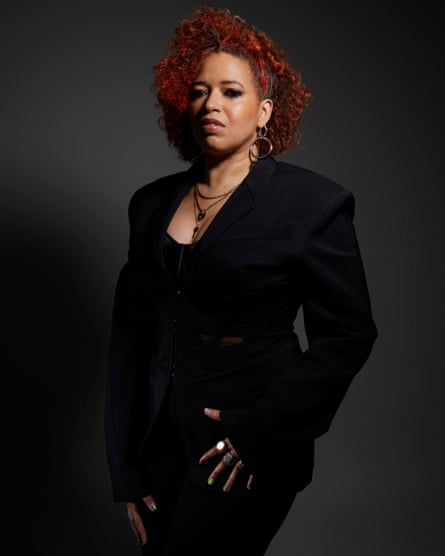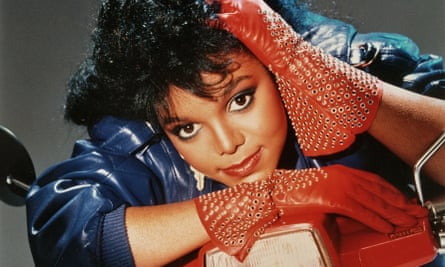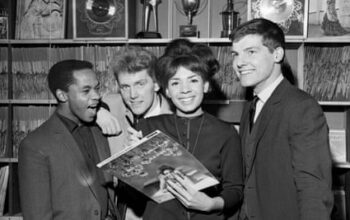It has been just over two decades since Justin Timberlake ripped off a piece of Janet Jackson’s bustier at the 2004 Super Bowl half-time show – an incident that saw her right breast briefly exposed to 70,000 in-person spectators and more than 140 million TV viewers in what became known as “Nipplegate”. Despite both singers chalking the moment up to a “wardrobe malfunction”, it sparked international outrage and left Jackson, then 37, blacklisted from a significant portion of the music industry for years. In contrast, 23-year-old Timberlake (having just left the boyband ’NSync) went on to thrive as a solo artist.
The role that race, age and gender played in the aftermath is the inspiration for US-born theatre-maker and performer Paula Varjack’s new play, Nine Sixteenths. As a black woman, “it feels like you are not allowed to put a foot wrong”, says 46-year-old Varjack, who now lives in London. “One thing goes wrong, and that is it,” she adds. “The terrifying thing for me about [Jackson’s] story is that I strongly believe it was an accident.”

Named after the length of time Jackson’s adorned breast was exposed to the world, Varjack’s show puts “Nipplegate” into a wider context. “How this nine-sixteenths of a second became more important than a 30-plus-year career, to me, speaks to the reality of being a black woman in the public eye,” Varjack says, noting that her three-part play will explore her own relationship to performance. At the Pleasance theatre in London this week, and then touring the UK in 2025, Varjack will perform alongside British choreographer Pauline Mayers, British actor Endy McKay, French choreographer Julienne Doko and the Nigerian-German poet Livia Kojo Alour at different points in the run. “I wanted to use this specific moment – and Jackson’s position in pop culture – as a reference point to have a larger conversation about what it means, for the women I will be on stage with and me, to hold our position in the world as black female performers over the age of 40.”
Like many young women in the early 2000s, Varjack saw Jackson as a “tremendous icon”. Before the Super Bowl, she was at the height of her career, riding on the success of her seventh studio album, All for You, which was also her fifth consecutive No 1 album in the US. When Varjack saw Jackson perform at Glastonbury in 2019, she was shocked to discover that she had continued releasing albums but to much lesser success. “I discovered that between 2004 and 2019 she was working – putting out album after album, music videos, doing films – and I was wondering how it all passed me by,” Varjack says. “Even the fact that she’d never been invited to perform at Glastonbury before – that I found kind of wild.”
Varjack later found out that “Nipplegate” saw Jackson’s music removed from several platforms, her invitation to the Grammy awards revoked, and plans for her to star in a Hollywood film abandoned. Meanwhile, Timberlake not only performed at the Grammys but also won an award that year. “Depending on which account you read, there are many people who say, because of this, there was a blanket ban on Janet Jackson’s music and videos across MTV and affiliated radio stations,” Varjack says. “Unfortunately, because America holds such a big position within the distribution of global pop culture, I’m sure it had a knock-on effect outside the US.” Slowly, things changed. In 2019, Jackson was finally inducted into the Rock & Roll Hall of Fame. She recently concluded a global tour.

Even 20 years on, there are contrasting opinions on the fateful moment that derailed Jackson’s career; some insist it was a planned “blunder”. Whatever happened, three years later Timberlake admitted to MTV that he only received about “10% of the blame” for it, pointing out, as many have, that being a black woman may have contributed to the disproportionally harsh treatment Jackson received afterwards.
For Varjack, her play is an opportunity to give Jackson her dues. “I’m not making a show saying this is someone who is a god, everything I’ve done is because of them or that I back everything that they’ve said and done,” she says. “I’m saying this person is arguably an artistic legend who created a body of work that had a big influence on me, the aspirations I had for myself, and I imagine many other people, too.” Now that Varjack is a performer, she knows “people will be looking to me as well”. One can only hope it’s with more compassion than was previously afforded to Jackson. While her career never fully bounced back from Nipplegate, Timberlake went on to headline the Super Bowl half-time show in 2018.
-
Nine Sixteenths is at the Pleasance theatre, London, 6-16 November. Then touring.
Source: theguardian.com


